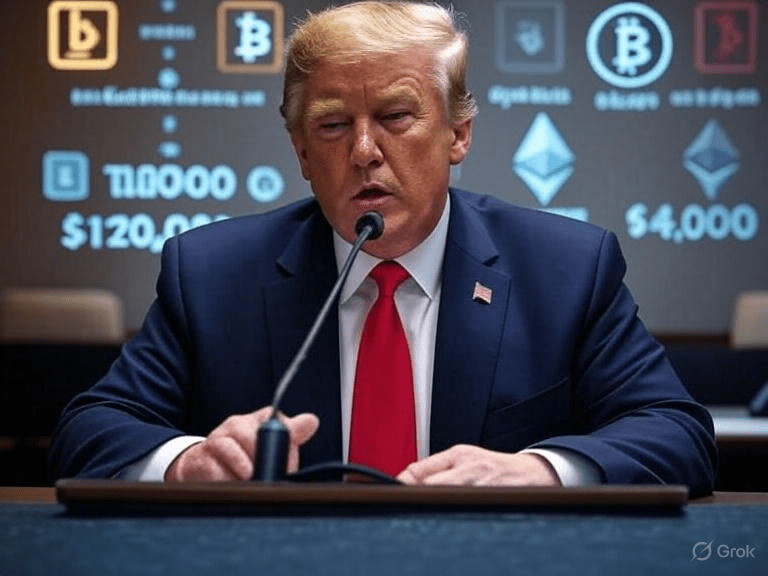Bitcoin soars at $120,000 and Ethereum approaches $4,000:
The impact of Trump's tariffs on risk appetite: The cryptocurrency market is witnessing a notable increase in prices, with Bitcoin reaching a new record high of $120,000, while Ethereum approached the $4,000 barrier for the first time since December 2024.
This rise comes amid escalating global trade tensions following President Donald Trump's announcement of new tariffs on the European Union and some other countries.
These developments have sparked a wide discussion about the impact of trade policies on risk appetite in financial markets, and how digital currencies have become an investment refuge under these conditions.
Bitcoin and Ethereum: A rise supported by optimism and U.S. policies. According to recent reports, Bitcoin has risen by 1.6% to reach $117,919, with expectations of further increases after touching its weekly low at $115,000.
At the same time, Ethereum rose by 0.85% to trade around $3,742, with anticipation of breaking the $4,000 level.
This upward momentum reflects strong institutional optimism, supported by recent U.S. legislation favoring digital currencies, such as the Genius Act, which aims to enhance the infrastructure for digital assets in the United States.
The Trump administration played a pivotal role in this rise. Since taking office, Trump has adopted policies supportive of digital currencies, including his announcement of creating a national crypto reserve that includes currencies like Bitcoin and Ethereum.
These steps have bolstered investor confidence, as banks and major investment funds have started promoting digital currencies as a hedging tool and a means to diversify investment portfolios.
Trump's tariffs: An unexpected catalyst for digital markets. In July 2025, Trump announced a 35% tariff on Canada and a 50% tariff on Brazil, with expectations of sending a similar notice to the European Union. These policies, aimed at protecting American industries, raised concerns in traditional markets, as global stock indices experienced sharp fluctuations.
For example, the Nikkei 225 index in Japan fell by 3%, and the Hang Seng index in Hong Kong dropped by 1.5%. However, it seems that digital currencies have benefited from these tensions.
Analysts believe that tariffs could weaken the dominant role of the U.S. dollar, increasing demand for alternative assets like Bitcoin. Former Goldman Sachs economic analyst Zach Pandl noted that tariffs could create space for currencies like Bitcoin to become global cash assets in the future.
Risk appetite: Bitcoin as an investment refuge. Despite the fluctuations affecting markets following the tariff announcement, digital currencies have shown remarkable resilience.
Analysts attribute this to the strong 'risk appetite' that remains among investors, especially with the increasing institutional investments in Bitcoin and Ethereum. Bitcoin exchange-traded funds saw net inflows of $2.75 billion in just one week in May 2025, while Ethereum funds attracted inflows of $248 million during the same period.
These flows reflect Bitcoin's transformation from a speculative asset to a major investment tool.
Additionally, Trump's announcement in April 2025 of a temporary halt to tariffs on some countries for 90 days led to an immediate spike in cryptocurrency prices, with Bitcoin jumping to $82,967 and Ethereum rising by 8%.
Future challenges: Volatility and opportunities. Despite the current optimism, analysts warn that the cryptocurrency market remains vulnerable to fluctuations.
A report from Reuters indicated that Bitcoin fell to a three-week low of $82,000 in February 2025 due to fears of a trade war.
However, experts like Ben Kurland, CEO of DYOR, believe that these fluctuations are temporary, and that the market will stabilize as trade policies become clearer.
On the other hand, some analysts believe that tariffs could lead to a global economic slowdown, potentially driving more investors towards digital assets as a safe alternative to gold, which has risen by 18% since the beginning of the year.
In summary: Bitcoin's rise to $120,000 and Ethereum's approach to $4,000 serve as evidence of the resilience of the cryptocurrency market in the face of global trade tensions. Trump's policies, whether through supporting digital currencies or imposing tariffs, have contributed to strengthening Bitcoin's position as a global investment asset.
With continued institutional optimism and capital flows into traded funds, it seems that digital currencies are poised for further gains, despite the risks associated with economic volatility. In this context, the central question remains: Will Bitcoin continue to rise as a symbol of scarcity and hedging, or will economic challenges impose a new reality on the markets?

